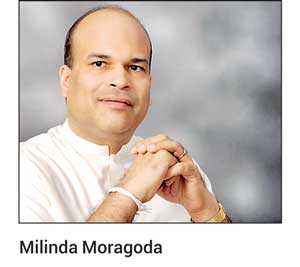Wednesday Feb 25, 2026
Wednesday Feb 25, 2026
Tuesday, 6 August 2019 00:12 - - {{hitsCtrl.values.hits}}
The catastrophic state of the power and energy sector of this country, especially regarding electricity generation and distribution, makes it imperative that every individual seeking to aspire to the office of the presidency provide a clear vision and policy on this critical issue.
The corruption and vested interests that dominate Sri Lanka’s energy sector are such that it requires a disruptive solutions that are out-of-the-box and forward-thinking. In the first instance, as India has done recently, firm target dates should be set for the introduction of electric mobility to the country. The timeline set by the Indian Government, for example, is as follows:
*Only electric three-wheelers will be operating by 2023 and only electric two-wheelers by 2025.
*30% of cars to be electrically powered by 2030.
Given the above, it is not unreasonable for Sri Lanka to seek to adopt the same time line as India. In fact, in Norway, electric cars accounted for 50% of last year’s total car sales and a total phase-out of combustion vehicles in the country is planned for by 2025.
Secondly, non-negotiable deadlines should be set for Sri Lanka to move towards solar and other alternate energy solutions. Every other nation in the world is moving rapidly in this direction, while we are being left far behind. As is the international practice, private investment should be the engine that drives the alternative energy sector. Government should limit its role to acting as facilitator, catalyst, regulator and protector of the consumer.
With the Presidential and Parliamentary Elections now on the horizon, the private-sector, civil society and the public at large, should push candidates to come forward and commit to innovative solutions to our energy crisis. It is not unusual for vested interests to push their parochial agendas during the election period in order to capture politicians at a time when they are the most vulnerable.
The billions of dollars that have been lost to our economy as a result of the mismanagement of the energy sector by successive governments, will justify any short-term investment cost that could be attributed to an accelerated plan to rapidly transfer Sri Lanka’s energy sector into renewables.
As much as President Jayewardene accelerated Mahaweli development and hydropower generation in the 1980s, the next president should have a vision and a clear strategy to transition Sri Lanka into an economy that is powered by solar power, alternative energy, and electric mobility.